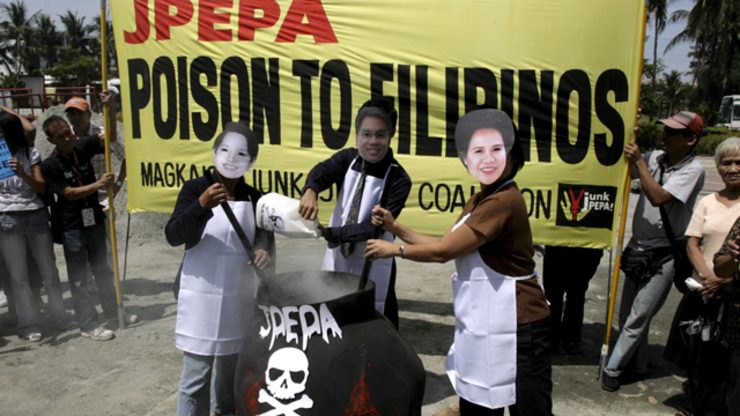SUMMARY
This is AI generated summarization, which may have errors. For context, always refer to the full article.

MANILA, Philippines – Six years after a petition was filed seeking to abolish the Japan-Philippine Economic Partnership Agreement (JPEPA), the Philippine Supreme Court (SC) is moving closer to resolving the case.
In a seven-page resolution released Thursday, October 30, the High Court required petitioners and respondents to submit a summary of their arguments on the legality of the agreement.
The petitioners filed their petition for the abolition of the JPEPA in December 2008, saying it violates several provisions in the Constitution. They noted that the agreement liberalized the entry of Japanese goods into the Philippines by reducing more its tariff lines that what Japan did for Philippine goods.
This, they said, violates Section 13, Article XII, of the Constitution, which mandates the State to pursue a trade policy that serves the general welfare and on the basis of equality and reciprocity.
The petitioners also said that by fixing tariffs, the executive branch encroached on Congress’ power.
Among the petitioners were former senators Jovito Salonga and Teofisto Guingona Jr.
The respondents are senators who ratified the JPEPA, namely: Manuel Villar Jr, Francis Pangilinan, Edgardo Angara, Rodolfo Biazon, Alan Peter Cayetano, Miriam Defensor Santiago, Jose “Jinggoy” Estrada, Juan Ponce Enrile, Richard Gordon, Gregorio Honasan II, Panfilo Lacson, Loren Legarda, Manuel “Lito” Lapid, Ramon “Bong” Revilla Jr, Manuel Roxas II, and Juan Miguel Zubiri.
Also named respondents are then Trade and Industry Secretary Peter Favila, Executive Secretary Eduardo Ermita, Finance Secretary Margarito Teves, Foreign Affairs Secretary Alberto Romulo, and Bureau of Customs Commissioner Napoleon Morales.
“No new issues may be raised by a party in the memorandum, and the issues raised in the pleadings but not included in the memorandum shall be deemed waived or abandoned. Being a summation of the parties’ previous pleadings, the Court may consider the memorandum alone in deciding or resolving this petition,” read the ruling promulgated by the justices on October 14.
The court is also seeking the opinions of 3 legal experts – retired SC Justice Florentino Feliciano and former University of the Philippines College of Law deans Merlin Magallona and Raul Pangalangan – before resolving the case. They will submit their memoranda within 60 days from receipt of notice.
Given the deadlines, the SC will be able to receive all the memoranda and begin deliberations around January 2015 at the latest.
Court spokesman Theodore Te said there is no need for oral arguments on the petition.
The groups also opposed the JPEPA because it supposedly legalizes the indiscriminate importation of toxic, hazardous, and other kinds of wastes from Japan. – Rappler.com
Add a comment
How does this make you feel?
There are no comments yet. Add your comment to start the conversation.